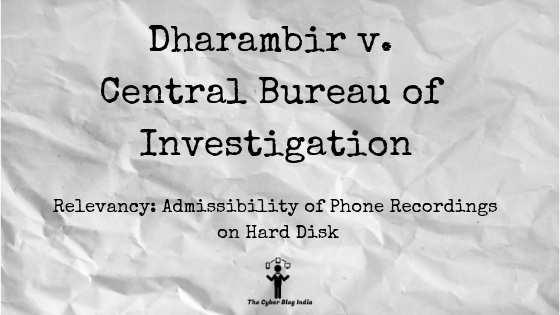Dharambir v. Central Bureau of Investigation

Dharambir v. Central Bureau of Investigation
148 (2008) DLT 289
In the High Court of Delhi
Crl. MC 1775/2006
Before Justice Dr. S. Muralidhar
Decided on March 11, 2008
Relevancy of the case: Admissibility of Phone Recordings on Hard Disk
Statutes & Provisions Involved
- The Information Technology Act, 2000 (Section 2(t) & 2(o))
- The Indian Evidence Act, 1872 (Section 3, 65B)
Relevant Facts of the Case
- The petitioners herein this case are accused of Criminal Conspiracy under Section 120B of IPC and are also charged under Section 7-12 read with Section 13 of Prevention of Corruption Act, 1988.
- During the investigation, telephonic conversations were recorded and stored in 4 Hard Disks which are kept at the Special Unit, CBI in New Delhi.
- The four computer systems containing the recordings were sent to Andhra Pradesh Forensic Science Laboratory.
- CDs were made for the four cases and they were sent to the Special Judge along with the charge sheets.
Prominent Arguments by the Advocates
- The counsel for the petitioner argued that the copies of CDs given to the accused were only partial and the complete evidence acquired must be given to the accused.
- The respondent counsel argued that the provisions under Section 65(B) have been followed by the CBI in letter and spirit in this case. Later, the CDs containing the relevant telephone conversations were sent to APFSL and were duly certified. Therefore, it is admissible evidence without the requirement of proof of production of the original computer output.
Opinion of the Bench
- The amended Evidence Act widely defines ‘document’ and ‘evidence’ in Section 3 read with Section 2(t) & 2(o) of the IT Act. In this case, the hard disk itself is a document which was used for recording the telephonic conversation. Hence, they are electronic records for both their latent and patent characteristics.
Final Directions
- The four HDs sent to APFSL must be brought back not later than 17th March 2008. The APFSL will keep the cloned copies of the HDs with them.
- As regard to the 19 CDs and 768 calls, these will be played before the learned Special Judge. There is no need to provide access to all 768 call recordings to the accused.
- The petitions and the applications stand disposed of.
इस केस के सारांश को हिंदी में पढ़ने के लिए यहाँ क्लिक करें | To read this case summary in Hindi, click here.
